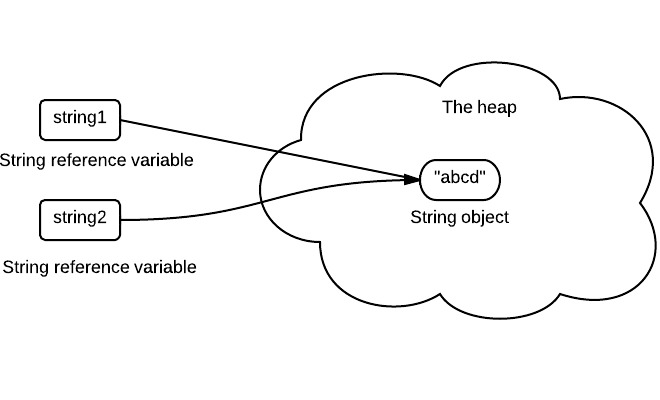Why Are Strings Immutable in Java? Safety and Performance Perks
Why Are Strings Immutable in Java? Safety and Performance Perks
Blog Article
Immutable Strings: A Trick Part in Ensuring Information Uniformity and Dependability
In the realm of information management, the significance of immutable strings can not be overstated. These imperishable sequences of personalities play an essential function in upholding the stability and precision of information within systems. By preserving a state of immutability, data consistency is made sure, fostering a foundation of reliability whereupon vital procedures count. The idea of immutable strings goes beyond simple formality; it is a cornerstone in the facility internet of data administration. As we explore the benefits, execution strategies, and useful applications of immutable strings, a clearer picture arises of their vital nature in protecting the electronic landscape.
The Concept of Unalterable Strings
Unalterable strings, a basic concept in programming, refer to strings that can not be modified when they are developed. Basically, once a string worth is designated, any kind of operation that appears to customize the string in fact creates a new string. This immutability makes sure information consistency and integrity in applications, as it stops unexpected modifications to the initial information.
Advantages in Data Consistency
Information uniformity is essential in numerous aspects of software growth, including database monitoring, multi-threaded settings, and dispersed systems (Why are strings immutable in Java?). Immutable strings contribute dramatically to attaining this uniformity by protecting against information corruption as a result of simultaneous access. In circumstances where numerous procedures or threads interact with the very same information concurrently, immutable strings act as a safeguard against race conditions and synchronization concerns
Moreover, the immutability of strings simplifies debugging and testing processes. With unalterable strings, designers can trust that as soon as a string is set, it will certainly remain unmodified, making it much easier to trace the source of mistakes and making sure that test situations generate constant results. This reliability in data managing inevitably brings about a lot more robust and stable applications.

Carrying Out Unalterable Strings
Guaranteeing the immutability of strings requires a thoughtful technique to their execution in software program advancement. As soon as a string item is produced, one crucial approach is to design string courses in a method that avoids alterations. By making strings immutable, designers can enhance information consistency and reliability in their applications.
To carry out immutable strings successfully, programmers must prefer creating brand-new string items instead of customizing existing ones. This technique guarantees that as soon as a string is designated a value, it can not be altered. Additionally, any kind of procedure that shows up to customize the string needs to develop a new string with the preferred adjustments rather than altering the original.
Furthermore, using immutable strings can streamline concurrency management in multi-threaded environments. Given that immutable strings can not be altered after production, they can be safely shared among several threads without the threat of information corruption.
Role in Dependability Assurance
In software development, the utilization of unalterable strings plays a critical role in making certain the reliability of data operations. Unalterable strings, when created, can not be changed, guaranteeing that the information they stand for continues to be regular throughout the application's implementation. This immutability home gives a level of guarantee that the data being processed will certainly not be unintentionally altered, causing unexpected outcomes or errors in the system.
By integrating immutable strings right into software layout, designers can enhance the integrity of their applications by lessening the dangers connected with mutable data - Why are strings immutable in Java?. Immutable strings help in preventing information corruption or unintended alterations, which can be particularly critical when managing delicate details or when data honesty is paramount
Moreover, making use of immutable strings streamlines concurrent handling, as numerous threads can securely accessibility and share string data without the danger of one thread modifying the content while another is reviewing it. This aspect contributes substantially to the overall integrity of the software application system, ensuring regular and foreseeable actions in data dealing with procedures.
Applications and System Integration
The seamless combination of immutable strings right into numerous applications and systems is crucial for ensuring robust data consistency and dependability across varied technical settings - Why are strings immutable in Java?. Unalterable strings play a critical duty in boosting the stability of information exchanges and communications within facility software program communities. By including unalterable strings into Click Here applications, designers can alleviate the dangers connected with data tampering, unapproved adjustments, and inadvertent modifications, therefore strengthening the general safety position of the system
In the context of system integration, immutable strings offer as a foundational aspect for developing protected communication networks and assisting in seamless data transfers in between different elements. Their unalterable nature guarantees that information transmitted in between systems remains proven and unmodified, lowering the likelihood of incongruities or errors that might compromise the integrity of the whole system. Moreover, unalterable strings can improve interoperability in between diverse systems by offering a standard style for information depiction, making it possible for more reliable information processing and exchange protocols across interconnected systems. By embracing immutable strings in applications and system assimilation processes, companies can strengthen their data framework and support the integrity and consistency of their information possessions.
Final Thought
To conclude, immutable strings play a critical duty in preserving data uniformity and integrity in various applications and system combinations. By ensuring that strings can not be altered when developed, the honesty of information is preserved, minimizing the risk of errors and variances. Applying immutable strings can dramatically enhance the reliability of systems, eventually resulting in more trustworthy and exact data handling.

Report this page